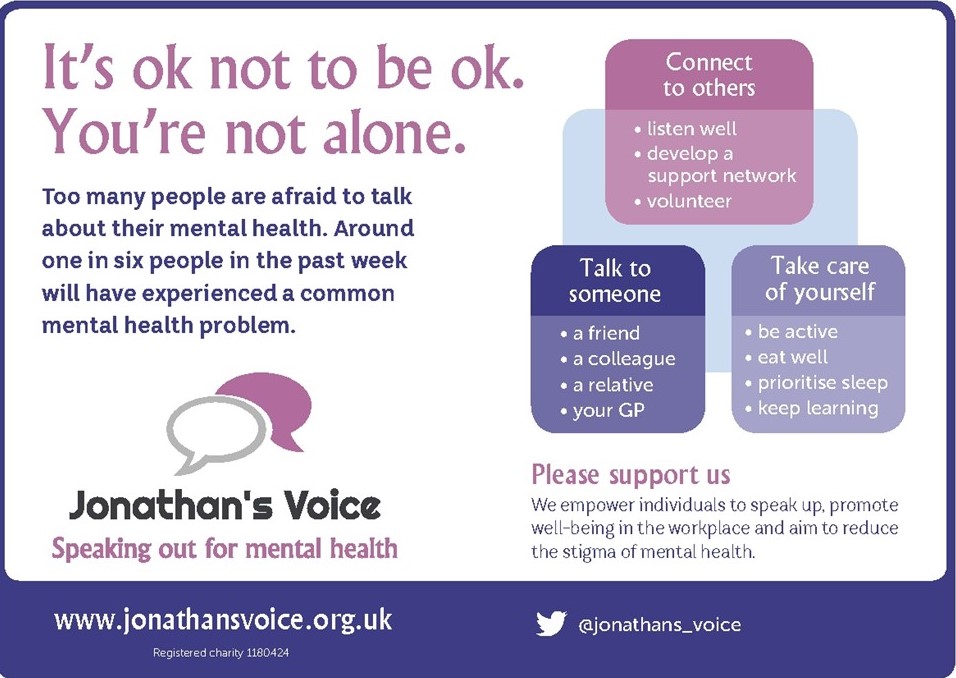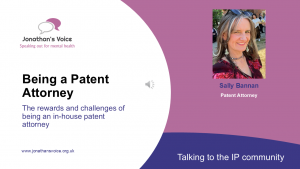Earlier in the year we were delighted to accept the very generous offer of one of Jonathan’s colleagues from Haseltine Lake Kempner to fund the placement of our advert, “It’s OK not to be OK”, in the Bristol Nine (BS9) magazine. We were then approached by Andy Fraser, the editor, and as a result of that contact Andy wrote and published the reflective and informative article below.
We are deeply grateful to Andy for his genuine interest in our story, his sensitive approach, for sharing his own experiences and his personal commitment to mental health and wellbeing.
The article was published in the November edition of Bristol Nine and Bristol Six + Eight, reaching approximately 25,000 households.
Andy is continuing to run the advert at no cost and for that we are very grateful.
You can read the article below or go directly to the magazine where you will find it on page 25 onwards at the following link https://issuu.com/bs9andy/docs/bs9_november_2019_for_issuu
Andy writes
“It’s
interesting when an advertiser who is “a little different” asks to feature in
the magazine – especially when they come out of the blue. Over the thirteen
years I’ve been publishing there have been many, and sometimes they come with
an interesting back story. So when David Brown contacted me a few months
ago wanting to advertise the charity “Jonathan’s Voice” in the magazine my
interest was raised, to discover what the organisation was all about, and what
the local link to Bristol was. To find out more I contacted the charity
founders Val and Graham McCartney up in Nottinghamshire, and learned more about
their poignant story, their work and crucially their very important message.
Jonathan McCartney, Val and Graham’s son, lived in Bristol and worked in the
centre of town for Haseltine Lake Kempner, a firm of European patent and trade
mark attorneys – alongside David Brown. Jonathan lived life to the full, was
successful at his work, was passionate about his football, being a Nottingham
Forest season ticket holder, and was both loved and loving. In 2017 at the age
of 35 he took his own life.
Bereavement is undoubtedly hard, and in
circumstances like this the sudden nature of a death makes it all the more so
for everyone affected. Jonathan’s suicide came out of the blue to everyone who
knew him. What I suspect is more frightening for his family and friends is
that, quite possibly, the events were as sudden and unexpected for Jonathan
too. Val and Graham told me of their sadness and their concern at how very
quickly their son must have been overwhelmed by the emotions that led him to
take the action he did. Jonathan very quickly went from, outwardly at least,
living life to the full to finding himself unable to cope.
Tragically the story of such a rapid and sometimes totally unexpected switch,
from being in control of, to being scarily out of control of, your emotions,
seems increasingly commonplace. All too many recent national news stories
testify to this. Closer to home, personal experience has taught me that a dark
cloud of despair can blow in from nowhere, with life-changing consequences. It
has also taught me the huge importance of being able to communicate feelings,
talk about fears and concerns to people who understand. Val and Graham are
understandably keen to get this message out.
Tragedy and adversity can often be the creators of understanding, the sharers
of wisdom, the bringers of positivity. Clearly Val and Graham are determined
that this will be the case, and the establishment of Jonathan’s Voice is the
tangible result of their desire to ensure that something positive will come
from Jonathan’s death. “Our purpose now is to work with organisations and
individuals to promote mental well-being in the workplace and beyond.
Through the work of everyone involved with the charity our aim is to reduce the
stigma associated with mental health issues, and to assist organisations in
developing the ways and means they can to better support their staff and
create better mental health practices in their workplaces.”
As so many small charities do, the team behind Jonathan’s Voice are trying to
make changes, raise awareness and provide help – while being totally reliant on
the kind donations and voluntary support of the organizations, groups, and
individuals they have managed to foster links with.
An example of this is through their research into developing good practice on
mental health care, work place wellbeing and suicide prevention, and then
sharing it with relevant workplaces. Awareness of the benefit of training of
Mental Health First Aiders (MHFA) is growing, and their role in promoting
mental wellbeing in the workplace is slowly becoming recognised. With the
support of Jonathan’s Voice, Haseltine Lake Kempner initially trained 24 MHFA’s
across their offices, and through the network of contacts the charity has developed
other companies are being encouraged to do the same. Interested organizations
can contact Jonathan’s Voice to access the bank of resources they are creating
– awareness literature, postcards and posters and presentation materials and
advice.
Val and Graham also tell me that they are working with other charities
and organizations who broadly share their objectives. In particular, noting
Jonathan’s profession, they are working in partnership with IP (Intellectual
Property) Inclusive – an initiative which brings people together from across
the IP sector to promote and improve equality, diversity, inclusion and
wellbeing within the IP community.
Jonathan’s love of football has also provided an opportunity to share the “It’s
OK not to be OK” message in relation to mental health, with the Nottingham
Forest Community Trust launching their “It’s Tricky To Talk” initiative and
opening their doors to a drop-in gathering for people living with mental health
issues or generally struggling with life.
The issue of our national mental health – men, women and our children – is one
that fills an ever-increasing amount of column inches in the printed press and
airtime on television and radio. In part that is, of course, sad and worrying,
as problems seem to becoming more widespread and pervasive. However there is
encouragement to be gained in that the shutters are coming up, the social
stigmas are being successfully challenged and, as Val and Graham McCartney and
others like them are keen to emphasise, it is important to talk – and it is OK
to admit you are not OK. In our workplaces things will continue to change –
from top down as senior managers become more aware of the necessity and duty to
promote a culture of office wellbeing and positive support to staff, and from
bottom up as more people feel open to voice their issues, talk about their
concerns and share their stories.









